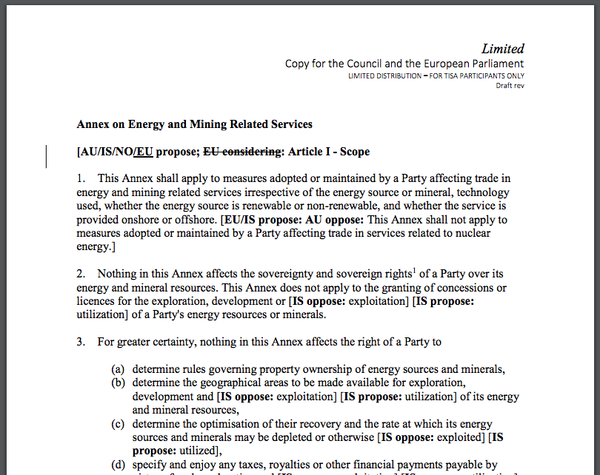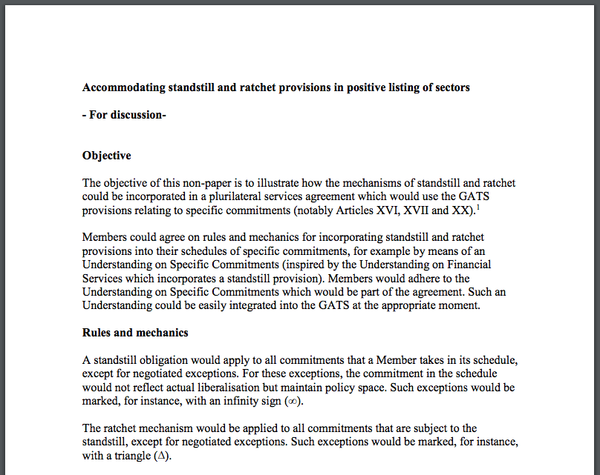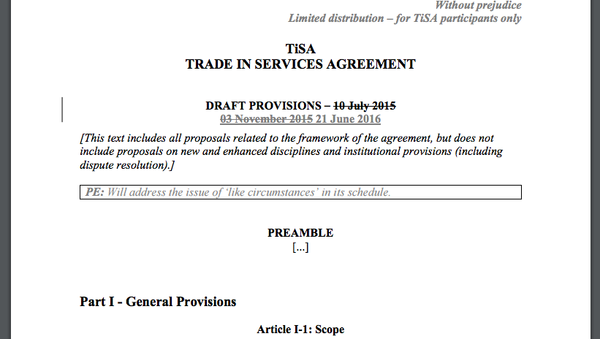Following the release of leaked material from intergovernmental meetings in June, opponents of the proposed TiSA trade deal say it would conflict with existing global climate change commitments, undermine the rights of national governments and give unprecedented power to multinational corporations.
Among the leaked documents released by Greenpeace Netherlands, concerns have been raised over a proposed annex on "energy and mining related services", which critics believe could give greater power to energy companies and free up restrictions on the exploration of fossil fuels.
Leaks from inside the secretive TiSA negotiations have emerged, revealing new threats to our climate. https://t.co/SKJUsfxvl5 #TiSAleaks
— Greenpeace Nederland (@GreenpeaceNL) September 19, 2016
Opponents of TiSA fear any such annexes would counter international commitments aimed at phasing out fossil fuels, such as those negotiated by national governments last December at the UN climate change summit in Paris.

"Its energy annex is not especially clear, with the term 'services related to' vague enough to cover any number of actions and phrases like 'market distortion' likely to kick-off a range of interpretations," a Greenpeace NL analysis of the leaked documents said.
"What is clear, however, beyond any specifics to do with ratchet and standstill clauses or necessity tests, is that there is a risk that TiSA could be used to take and support actions that go against the global climate agreement signed in Paris."
Ratchet and Standstill Clauses: 'Lock-In' Liberalization
The TiSA leaks have also raised concerns about the undermining of national governments and increase in power given to multinational corporations under controversial clauses.
The leaked documents contain references to "ratchet" or "standstill" clauses, which critics say will essentially require signature states to "lock-in" market deregulation and liberalization.
The secret TISA documents revealed at https://t.co/FEbodVQq3n show climate action under threat. #TiSAleaks #stopTiSA pic.twitter.com/MKGlLsz4Sj
— Greenpeace Nederland (@GreenpeaceNL) September 20, 2016
"The standstill clause freezes the extent of liberalization in certain sectors, which means the markets of TiSA state can never be less liberalized than they were at the time they signed the deal," Greenpeace said.
"Meanwhile the ratchet clause — which sometimes appears in other trade agreements — stops countries from reintroducing trade barriers that had been previously and unilaterally removed.
Greenpeace Netherlands leaks fresh TiSA documents https://t.co/tgNMEDpAWZ pic.twitter.com/EIEocJTRAW
— Faiza Oulahsen (@faizaoulahsen) September 19, 2016
"Together these two clauses undermine the ability of governments to ever reverse the liberalization of services, even if elected on a mandate to do it."
Crucial clauses in previous trade agreements have allowed multinational corporations to sue national governments over various policies, with fears the ratification of TiSA could see big business shaping national policy.
"Google and Facebook should not determine privacy rights, banks should not regulate banks and having the fossil fuel industry involved in environmental policy is as senseless as the tobacco industry having a say in health policy. Let those decisions be made by the people via the governments they elect," Greenpeace spokesperson Susan Cohen Jehoram said.
Concerns Over TiSA
The fresh leaks have added more opposition to the highly controversial TiSA deal, which mirrors similar international trade agreements like TTIP, TPP and CETA.
While TTIP and the TPP focus on all parts of trade, TiSA strictly focuses on the service industry and is being negotiated by 50 countries worldwide, including the EU, US, Japan, Canada and Australia.
Secret trade documents leaked — our response to the #TiSAleaks https://t.co/ZAj3Q5VxDj #noTTIP
— Global Justice Now (@GlobalJusticeUK) September 20, 2016
While proponents of TiSA and other agreements say the deals will lower international trade barriers and promote more international growth, critics argue the agreements will ultimately wash away workers' rights, undermine environmental targets, challenge the sovereignty of national governments and give unprecedented power to multinational corporations.
Concerns have also been raised at the nature of discussions, which have been carried out in secret by national leaders and government representatives, leading to questions over transparency.

"It's a sad day for democracy when ordinary people are dependent on leaks to learn about the far-reaching consequences of toxic trade deals that are being cooked up behind closed doors," said Nick Dearden, director of the UK-based campaign group Global Justice Now.
"These leaks confirm what civil society groups, trade unions and consumer watchdogs across the world have been warning against, that TiSA is a turbo-charged privatization and deregulation deal that will enormously benefit corporations at the expense of ordinary people and democracy itself."
TiSA is still being negotiated by national leaders, however government officials are bound from commenting on the nature of the agreement until talks have been completed.


